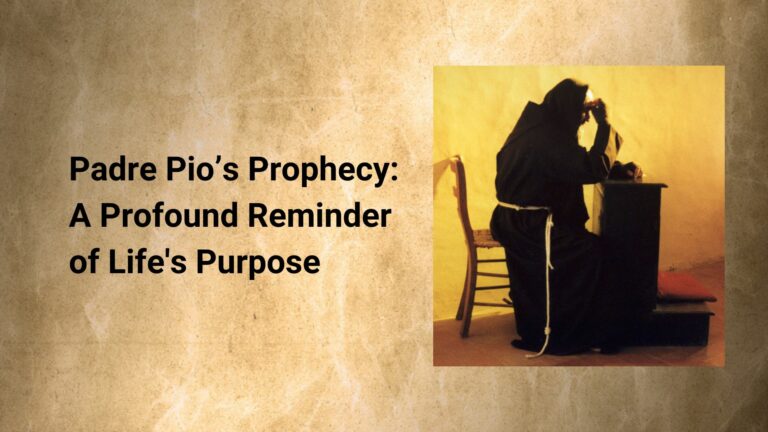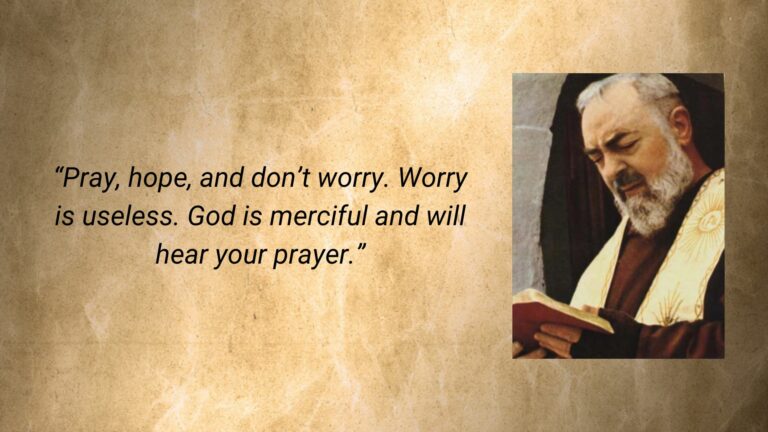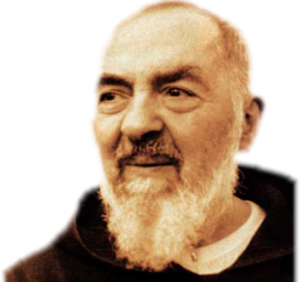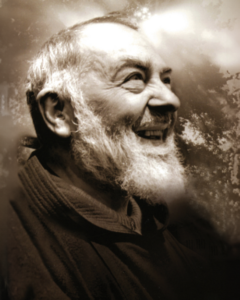
Imagine being told, with absolute certainty, that you only have a few days left to live. This unsettling news was delivered to a young Italian policeman by none other than Padre Pio, the Capuchin friar, mystic, and miracle worker whose life continues to inspire millions. The story, while remarkable, also teaches us a vital lesson about the fleeting nature of life and the importance of living with purpose.
Padre Pio’s Prophecy of Death
The story originates from Brother Arni Decorte’s book, Saint Padre Pio – A Privileged Witness of Christ, in which he recounts a particularly profound moment in Padre Pio’s life. It begins in San Giovanni Rotondo, where large crowds would gather to see the friar. To ensure his safety, two carabinieri, members of the Italian military police, were often stationed to guard him.
One day, after celebrating Mass, Padre Pio asked one of the policemen to meet him in his cell. The young officer, undoubtedly honoured, eagerly agreed. However, when the moment came, the message Padre Pio delivered was far from what the young man expected. “In eight days, you will go to the house of the Eternal Father. You are going to die,” Padre Pio told him. Naturally, the policeman was shocked. He protested, explaining that he felt perfectly healthy. Padre Pio, with a gentle but firm reassurance, responded, “In eight days, you will feel even better.”
This conversation was the start of a journey that would forever change the young man’s life—or, more precisely, its final days. Padre Pio advised the policeman to go home, put his affairs in order, and not tell anyone about the prophecy until he was with his family. Following the friar’s instructions, the officer requested leave from his post. Initially, his request was denied, as he couldn’t explain the true reason for his urgency. It wasn’t until Padre Pio personally intervened that his commander allowed the leave.
Upon returning home, the policeman confided in his family about Padre Pio’s words. Eight days later, as predicted, he passed away suddenly. This event, while tragic, was a powerful testament to Padre Pio’s gift of prophecy, but more importantly, it serves as a reminder of the impermanence of life.

A Reflection on the True Purpose of Life
What does this story teach us? It’s more than just a miracle or a prophecy; it’s a call to reflect on the true meaning of life. Padre Pio reminded the policeman that life is a pilgrimage, a journey towards God. This spiritual perspective is something many of us tend to lose sight of in the hustle and bustle of modern life.
We often find ourselves chasing after personal goals, ambitions, and material possessions. While there’s nothing inherently wrong with these pursuits, they shouldn’t overshadow the deeper purpose for which we were created. As stated in the Catechism of the Catholic Church, “The purpose of the life of man is to know and love God” (CCC 1-2). This simple yet profound truth often gets buried under the distractions of everyday life.
The story of Padre Pio and the young policeman urges us to realign our priorities and remember that our time on Earth is finite. We do not know the day or the hour of our death, nor the time of Christ’s return. This uncertainty should not lead us to fear but rather inspire us to live with purpose, making sure our hearts and minds are prepared to meet God when the time comes.
Living in a State of Grace
One of the most valuable lessons from this story is the importance of remaining spiritually vigilant. If the young policeman had ignored Padre Pio’s advice or dismissed his prophecy, he might not have had the opportunity to prepare himself for death in the way that he did. It’s a stark reminder that we should always strive to live in a state of grace, ensuring that our relationship with God is a priority.
In The Imitation of Christ, Thomas à Kempis offers a similar reminder: “Meditate, therefore, on the four last things and you shall not perish eternally: death, judgment, heaven, and hell.” Reflecting on these eternal realities helps to put our lives into perspective. It sharpens our focus on the things that truly matter and helps us to avoid sin, thus keeping our souls in a state of readiness.
Embracing the Present While Preparing for Eternity
The story also speaks to the balance between living fully in the present while being mindful of eternity. The young policeman, though given an unusual and unsettling revelation, was able to embrace his final days with clarity and purpose. He spent time with his loved ones and put his affairs in order, knowing that his life on Earth was about to end. It’s a poignant reminder that we, too, should live with the same sense of urgency—not in a morbid or fearful way, but with the awareness that our lives are a gift from God, and we should use that gift wisely.
Preparing for eternity doesn’t mean neglecting the joys and responsibilities of daily life. Instead, it calls for a balanced approach—enjoying the blessings we have while keeping our eyes fixed on the ultimate goal: union with God in Heaven.
A Call to Live with Purpose
The prophecy Padre Pio shared with the young policeman is not just an extraordinary story of a saint’s mystical gift. It’s a call to each of us to reflect on our own lives and the direction we are headed. Are we living with purpose, mindful of our journey towards God? Are we prepared, spiritually, to meet our Creator whenever that moment arrives?
We may not receive a direct prophecy like the one Padre Pio gave, but the lesson remains the same: life is short, and our ultimate goal is not personal success or comfort but union with God. As we move forward in our daily lives, let us strive to live each day in a state of grace, deepening our relationship with God and embracing the journey ahead. May Padre Pio’s life and message continue to inspire and guide us on our path towards eternity.
In the words of Padre Pio, “Pray, hope, and don’t worry. Worry is useless. God is merciful and will hear your prayer.” Let us take comfort in these words and live each day with trust in God’s divine plan.



